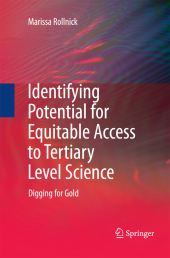 Neuerscheinungen 2014Stand: 2020-02-01 |
Schnellsuche
ISBN/Stichwort/Autor
|
Herderstraße 10
10625 Berlin
Tel.: 030 315 714 16
Fax 030 315 714 14
info@buchspektrum.de |

Marissa Rollnick
Identifying Potential for Equitable Access to Tertiary Level Science
Digging for Gold
2010. 2014. vii, 183 S. 235 mm
Verlag/Jahr: SPRINGER NETHERLANDS; SPRINGER 2014
ISBN: 9401784949 (9401784949)
Neue ISBN: 978-9401784948 (9789401784948)
Preis und Lieferzeit: Bitte klicken
This book explores the challenges and solutions that accompany a global increase in the number of non traditional and underprepared
students seeking higher education. The focus is on science learning at the interface of secondary and tertiary education levels.
Higher education internationally is in a state of transition and transformation, leading to an increase in the level of participation, and a consequent increase in number of non traditional and underprepared students. The appearance of these students provides a particular challenge in the sciences where adequate grounding is crucial. One response to this challenge has been the provision of access, foundation or "second chance programmes" which operate on different models internationally. In South Africa, where the push for equity is strong in the wake of the apartheid era, programmes have generally been established at all tertiary institutions with some of the most successful of these programmes based at universities characterised by a high research output. Consequently in the last decade there has been a great deal of research into the effectiveness of these programmes both at a micro and macro level. Similar research in other countries exists, but is patchy and often based on small groups of students. This book provides valuable information on what research has to say about disadvantaged and under prepared science students and how they learn - what works and what does not work. It provides an examination of issues related to the programmes, their structure, student selection and adjustment. Issues such the learning of these students, their communicative ability and laboratory work come under the spotlight. Although examining the issue internationally, the book draws heavily on lessons from South Africa where there has been considerably experience of such programmes.
Chapter 1: Introduction
M. Rollnick
Section A. Issues in Student Access
Chapter 2: Issues in Science Access
M. Rollnick
Chapter 3: A survey of programmes: successes in Science access
M. Rollnick
Chapter 4: selection and identification of Potential
M. Rollnick
Chapter 5: Adjustment of Underprepared students to tertiary education
Bette Davidowitz and Marissa Rollnick
B. Lessons from Africa
Chapter 6:Research on Teaching and learning in access courses
Lorna Holtman and Marissa Rollnick
Chapter 7: Experimental work in science
Fred Lubben, Saalih Allie and Andy Buffler
Chapter 8. Language and communicative competence
M. Rollnick
Chapter 9: Conclusion: The future of access programmes
Bruce Kloot


